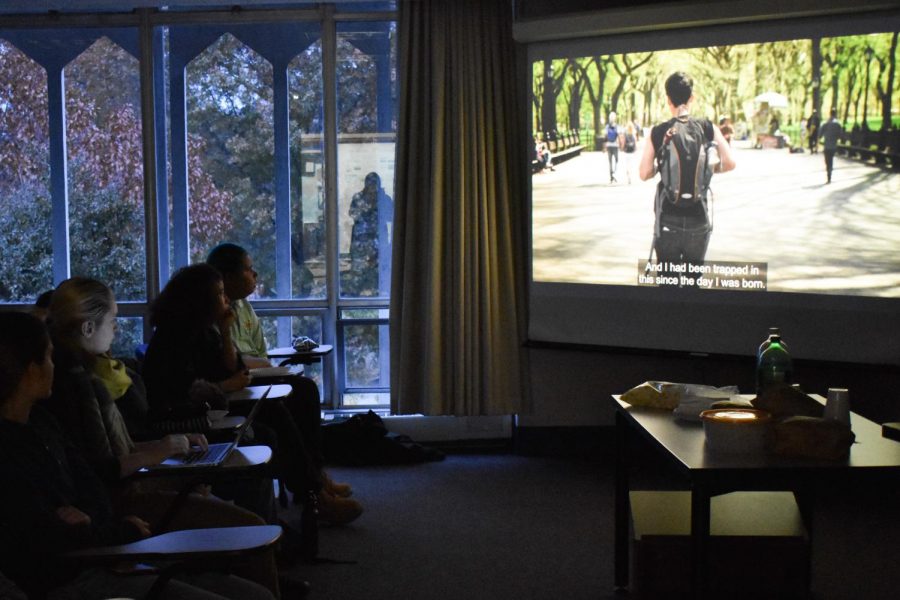MRC Program Supports Trans Students
Students watch a screening of the documentary, We Exist: Beyond the Binary, as part of Trans Week of Action.
The Multicultural Resource Center launched new programming this week for the College’s third annual Trans Week of Action. Beginning last Sunday, students and staff organized events aimed at providing safe spaces and resources for trans students. The programming ends on Trans Day of Remembrance this Sunday with a vigil honoring trans folks affected by hate.
“The Trans Day of Remembrance vigil is something we do every year, since it’s a national event and there is already so much erasure of and ignorance about violence against trans folks, especially Black and Latinx trans women,” LGBTQ Student Life Director Elliot Director said.
The other three events this week are entirely new, including a Trans Narratives Open Mic, a film screening of the documentary We Exist: Beyond the Binary, which details the personal narratives of nonbinary individuals, and a clothing drive for queer and trans students entering the workplace.
“These events were chosen because they address basic issues often faced by trans folk that many cis folk take for granted,” MRC Student Associate Ti Ames said.
Ames organized the documentary screening, which was open to all, on Wednesday, hosting a question and answer session afterward to address differing opinions on the film and approaches to activism.
“The film screening started some much-needed dialogue about gender nonconformity and revealed several biases we as a college community share,” Ames said.
College first-year Or Pnini was one of the students in attendance at the film screening, and felt encouraged by the community involvement throughout the week.
“I’m happy that community exists here, and that people are so outspoken about who they are,” Pnini said.
While some events prioritized discussion, others focused on material resources. The Queer/Trans Professional Clothes Drive on Thursday aimed to help queer and trans students find professional clothing for the workplace.
“I think [the Queer/Trans Professional Clothes Drive is] important to [Trans Week of Action] because I believe that presentation and expression affect those who identify as trans/nonbinary/gender-nonconforming in a lot of ways,” College senior Le’Priya White said. “I feel like they are the ones more worried about being judged and put in situations where they might have to pick and choose. … No one should ever feel like they have to compromise who they are to do something.”
White proposed and organized the event as part of her community service project for the Point Foundation Scholars program, a national scholarship for LGBTQ students. White was inspired by the fashion of queer and trans people of color, and her own experience with the standard of professional dress in the workplace.
“I often reflected on taking ‘interview prep’ classes on how to ace an interview and make a good impression,” White said. “It seems to have emphasis on women with dresses and skirts and men with suits and ties. That made me feel uncomfortable, but I was the only woman there that could be considered ‘masculine-presenting’ so I never said anything.”
In 2017, one-fifth of LGBTQ Americans reported experiencing harassment based on their gender identity or sexual orientation in the job hiring process. Queer and trans people of color are 32 percent more likely to experience harassment in the workplace than white members of the LGBTQ community according to the Discrimination in America poll conducted by the Harvard T.H. Chan School of Public Health, Robert Wood Johnson Foundation, and National Public Radio. For White, the clothing drive was an opportunity for queer and trans students — especially those of color — to have access to resources that may have been denied in the past.
“What if you can’t afford certain clothes?” White said. “Sometimes we can barely afford to attend school, let alone [find] clothes to get opportunities after it, you know? So I thought this was a great way to bring my community together and give them a resource to find clothes … so they can get the job they want and be comfortable in their skin at the same time.”
Late October, the Trump administration revealed the office was considering altering the legal definition of gender to “male or female based on immutable biological traits.” In essence, this would erase federal recognition of transgender identity and confine individuals to the gender assigned on their original birth certificate.
On Oct. 24, the MRC posted a message of solidarity to Facebook, writing, “Oberlin College has long recognized the dignity and worth of transgender, nonbinary, and intersex people. Oberlin policy protects community members against discrimination and harassment based on gender identity and expression. We did so before the federal government recognized transgender students and will continue to do so regardless of any change.”
In light of the national conversation, organizers for this year’s Trans Week of Action remained focused on prioritizing students.
“We’re taking time to focus on what is important to the trans community here and now because this is the community that matters most to us,” Ames said. “Trans lives have always been threatened, but that won’t stop us from doing the work we must do as a staff and community of the MRC to make sure it is always voiced and demonstrated that trans lives matter.”
Students and staff agree that while the MRC put forth considerable effort for the week’s programming, there are still many actions the College could take to support trans students.
“I was disappointed coming out of the film screening and having to pick a binary bathroom [on the third floor of King Building],” College first-year Thandiwe Seagraves said.
Ames advises the College take steps such as finding staff to connect LGBTQ alumni, coordinating transportation for students to access certain health resources off campus, reinstating the Edmonia Lewis Center, and hiring staff to lead “Beyond the Binary” trainings, an introduction to gender, sexuality, identity, expression, and combating harmful societal norms.







